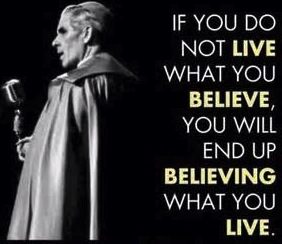Readings for Thursday of the Fourth Week in Advent: 1 Samuel 1:24-28; 1 Samuel 2:1, 4-8; Luke 46-56
" . . . he has scattered the proud in the imagination of their hearts . . . " Luke 1:51
Today we hear the beautiful words of Mary's Magnificat, spoken when she visited Elizabeth after the Annunciation. So much can--and has--been written over the centuries about Mary's prayerful proclamation. For some reason, as a I read and reflected on the Magnificat this morning, her statement about God scattering the proud "in the imagination of their hearts" stood out to me more than it has in the past.
As Christians, most of us realize that pride is a capital sin; that it can cut us off from divine truth; and that it is the opposite of humility--the disposition of heart God call us all to have. Mary's words certainly encapsulate all of these realities. But pride can manifest itself in many ways, including despair. For when we despair, we fail to trust in God and His promises, pridefully losing hope in our personal salvation from God. (CCC ¶ 2091) And sadly, for some, these feelings of despair can become more focused or exacerbated during this time of year; the struggles of everyday life reminding us that things aren't quite what they should be.
As Mary tells us, however, this prideful despair reigns only in the "imagination of our hearts," having no basis in reality. Although our problems may be real, they should never cause us to despair and lose hope, for God fills "the hungry--[us]--with good things." More importantly, "neither death, or life, nor angels, nor principalities, nor things present, nor things to come, nor powers, nor height, nor depth, nor anything else in creation will be able to separate us from the love of God in Christ Jesus our Lord." (Romans 8:38-39) So as Advent comes to a close, cling to this promise and never despair. And with Mary, proclaim "my spirit rejoices in God my Savior!"
God love you.
